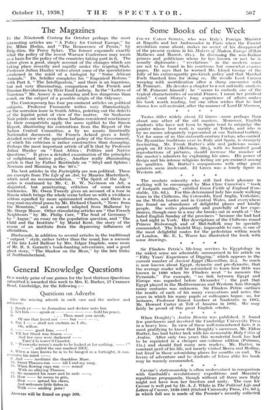The Magazines
Is the Nineteenth Century for October perhaps the most interesting articles are "A Policy for Central Europe," by Dr. Milan Hodza, and "The Renascence of Persia," by Brig.-Gen. Sir Percy Sykes. The former expounds exactly what the policy of the recent Warsaw Conference may mean as a basis for the policy of the countries taking part in it. The latter gives a good, simple account of the changes which are taking place recently and rapidly under the reigning Shah. Professor Julian Huxley writes about some of the speculations awakened in the mind of a biologist by "Some African Animals." Dr. Schiller completes his " Eugenical Reform" with Part 3, "The Intelligentsia," and there is an ingenious, but not very illuminating, comparison of the French and Russian Revolutions by Herr Emil Ludwig. In the "Letters of Nausicaa" Mr. Amery is as amusing and less dangerous than usual, on the subject of a possible origin of the Odyssey.
The Contemporary has four pre-eminent articles on political subjects. Professor Fremantle writes very illuminatingly on the secession issue in South Africa, pointing out the defects of the legalist point of view of the matter. Sir Sankaran Nair points out why even those Indians considered reactionary by their compatriots apply the same epithet to the Simon Report, illustrating his contentions from the Report of the Indian Central Committee, a by no means fanatically Nationalist document. Sir Francis Acland gives a fairly detailed review of the agricultural policy of the Government, of which his criticism is rather constructive than damaging. Perhaps the most important article of ant that by Professor Julian Huxley on "East Africa : Politics and Native Questions." It gives a detailed examination of the principles of enlightened native policy. Another really illuminating article is that by Father Martindale on "Sibyl and Sphinx : Newman and Manning in the '80's."
The best articles in the Fortnightly are non political. These are excerpts from The Life of an Ant, by Maurice Maeterlinck, which need no recommendation. "The Spirit of the Age" series is continued by Mr. C. R. W. Nevinson on Art, a disjointed, but penetrating, criticism of some modern tendencies. Mr. Owen Tweedy gives an account of a tour in Russia which brings the whole scene before us with a vividness seldom equalled by more opinionated writers, and there is a long semi-mystical poem by Mr. Richard Church, " News front the Mountain," and a sonnet adapted from Mallarrne by Mr. Sturge Moore. Other stimulating articles are" Our French Neighbours" by Mr. Philip Carr, "The Soul of Germany" by "Augur," an essay on the population question, and "The Child and the Institute" by Muriel Kent, the story of the rescue of an institute from the depressing influences of officialdom.
Blackwoods, in addition to several articles in the traditional " outpost " style, rather better than the usual, has a memoir of the late Lord Balfour by Mrs. Edgar Dugdale, some more of Mr. R. S. Garnett's book-hunting adventures, and a good ghost story, "The Shadow on the Moor," by the late Duke of Northumberland.








































 Previous page
Previous page